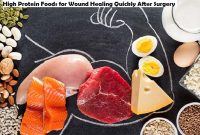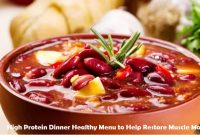High protein foods for stunted children are not a separate concern. The term stunting may be familiar to toddlers. This is a condition where the growth and height of a toddler do not match the ideal height for his or her age. This occurs due to a lack of balanced nutritional intake. This has happened a lot in several countries, and has even become one of the government programs to prevent stunting itself.
The most important way to prevent this is from parents. How do parents care for their children when they are toddlers? Do they provide nutritious food or even ready-to-eat food such as sausages or nuggets and the like? This example is not the best recommendation. Because toddlers are growing, they must also consume nutritious food to support their growth and development.

Some High Protein Foods for Stunting Children
Not all nutritious food has to be purchased at an expensive price. Likewise, the a need for high protein for stunted children. Parents can get this food at affordable prices. Examples are tempeh and tofu. Both are sources of vegetable protein whose basic ingredients are soybeans. Where every 100 grams of tempeh contains 14 grams of protein and tofu 10.9 grams of protein.
That’s not enough, but tofu and tempeh also contain iron. It is certain that iron also has benefits for children’s growth and development. Starting from improving the immune system maintaining bone health and increasing the body’s energy.
Nuts
Next, there are nuts. Maybe many parents find that their children don’t really like nuts. But know that nuts are an excellent alternative food to meet the protein needs of toddlers who suffer from stunting. An example is green beans. One serving is equivalent to 100 grams which contains 8.7 grams of protein. Green beans are also used as additional food for toddlers.
Not only green beans but also peanuts. Peanuts contain magnesium and vitamin E as well as copper folate and arginine. It turns out that a quarter cup portion of peanuts contains 9 grams of protein or the equivalent of 18% of daily protein needs.
Based on the Instagram video @susimarine.id, it turns out that green beans and peanuts can be a good alternative for children who have difficulty eating nuts. Green beans, for example, are very rich in protein and are suitable for supporting the nutritional needs of toddlers, especially for children who experience stunting. In fact, peanuts also have many benefits with magnesium and vitamin E content that helps your little one grow and develop. A quarter cup of peanuts contains 9 grams of protein, enough to meet some of their daily protein needs.
Egg
This form of high-protein food may already be familiar to your ears. We can buy 1 kilo of this food for 30,000. Very suitable for preventing stunting.
Sometimes a breastfeeding mother or a toddler mother also has to consume this food. The reason is that this food is a good source of protein. Naturaly stunted children are encouraged to consume eggs.
Eggs contain amino acids which are very good for the body of the baby and the mother. This food for stunted children also contains a dozen vitamins and minerals, including colin, which is very good for baby’s brain development.
Fish and Chicken Liver
There is still chicken liver which is also one of the foods at an affordable price and has high protein, suitable for stunted children. In 100 grams of Raw Chicken Liver there is 27.4% protein. Chicken liver is also low in calories so it will make you full faster and last longer.
The next recommendation for high protein foods for stunted children is fish. For example, mackerel contains vitamins B2, B3, B6 and B12 and vitamin D. Don’t miss out on fruit and vegetables.
For example, as a nutritionist who works in a remote village, he often encounters children who are stunted. When educating mothers about the importance of balanced nutrition, the importance of fish consumption, especially mackerel, is always emphasized. The high content of vitamins B2, B3, B6, B12, and D in mackerel is highly favorable. To make it easier to understand, share the true story of a child who experienced a significant increase in growth after regularly consuming fish. The mothers also became more enthusiastic and willing to include high protein foods for stunted children’s menus. /tari



